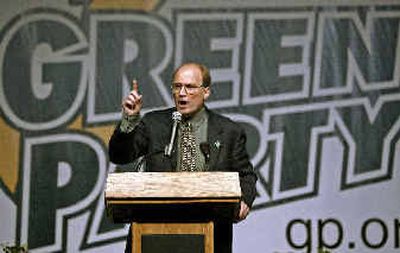Green Party nominates Cobb over Nader

MILWAUKEE – The Green Party nominated Texas attorney David Cobb as its candidate for president Saturday, rejecting Ralph Nader’s efforts to secure the party’s formal endorsement and likely access to the ballot in key states like Wisconsin and California.
Nader, the party’s candidate in 1996 and 2000, had told Green officials months ago he would not accept the party’s nomination for president, preferring to build a coalition of third-party groups and independents rather than running under one banner.
Still, he openly courted their formal endorsement as a means to get on the ballot in the 22 states and Washington, D.C., where the party has a ballot line.
But 408 delegates voted for Cobb on the second ballot to give him the nomination.
Nader’s supporters had cast an endorsement for him as the only real option for Greens if they hoped to maintain their national profile and play a role in the presidential race.
But Cobb has touted himself as a homegrown Green who would work to build the party from the ground up, while Nader has maintained he is not a member of the party and does not plan to join.
Cobb went out of his way to praise Nader in accepting the nomination, but said later the vote was a sign the Green Party “has gotten out from under the shadow of a man who has probably cast a larger shadow than any other living American.”
The party’s endorsement would not have guaranteed Nader the Green Party’s ballot lines. Rather, it would have given state chapter officials the option of presenting Nader as the candidate of their choice for president to state election officials. Still, that prospect was much less daunting than other means for getting on the ballot.
In California, for example, Nader will have to gather more than 150,000 signatures to get on the ballot as an independent.
Nader tapped longtime Green activist Peter Camejo as his running mate this week, a step his supporters hoped would bolster his chances of winning the party’s endorsement.
Many Democrats still blame Nader for President Bush’s victory four years ago and fear he could still siphon off enough votes to hand the Republican a second term.
Nader recently was polling about 6 percent nationally, according to an Associated Press poll conducted by Ipsos-Public Affairs.
Nader spokesman Kevin Zeese said the consumer activist knew he faced an uphill battle for the party’s endorsement by electing in December not to participate in the primary process and not sending representatives to the party convention until this week.
He said Nader would now turn his attention to his drive to get on the ballot by other means in states where Greens have access and said Greens will not know until Election Day whether their decision to back someone else will pay off.
Nader already has the backing of the Reform Party, which has ballot access in seven states, but he has yet to be placed on any state ballots.